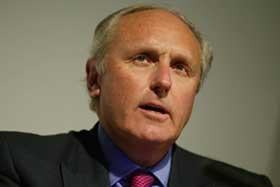
The first stage of the Leveson Inquiry into the hacking scandal concluded yesterday with a refusal from Paul Dacre to retract his “mendacious smears” attack on actor Hugh Grant.
The Daily Mail editor also issued a warning that newspapers would be unable to cope with the likes of Facebook if they were over-regulated as a result of Lord Justice Leveson’s investigation.
Dacre was called in to to give evidence for a second time this week to account for the statement issued by the Mail on Sunday, and approved by him as editor-in-chief, in which he accused Grant of spreading “mendacious smears” by accusing Associated Newspapers of getting a story by phone-hacking on the first day of the inquiry back in November.
Lord Justice Leveson said: “Mr Grant came here and said – I think he used the word ‘speculate’, I think he meant ‘infer’, having had an idea that this might have come from hacking.
“That’s how he put it, and I think he said: ‘I’d love to hear the different explanation.’ And you on behalf of the Mail were absolutely entitled to say, ‘He can think, he can infer what he wishes, he can think what he likes, he’s entitled to, but he’s wrong.’
“…But the story that came out contained within it ‘Mr Grant is guilty of a mendacious smear’. He is deliberately lying, that’s what it means. In other words, he’s made a conscious decision, knowing perfectly well it’s not true, to say it on oath.”
Refusing to retract the statement, Dacre instead defended his decision to accuse the actor of making a conscious decision to mislead the inquiry.
He said: “Mr Grant, the poster boy for Hacked Off, is giving evidence on the first day, an international film star. He makes his allegation. It wasn’t an innocent piece of evidence; it had been drawn out of him by the inquiry. He makes it. He hadn’t included it in his witness statement. He knew, I would suggest, the damage it would cause.
“After all, allegations of phone-hacking have closed down a newspaper and has resulted in the loss of work by hundreds and hundreds of journalists. It was explosive and it was toxic and he, as a very sophisticated communicator, he deals with the press all his life, knew the damage it would cause.
“What he omitted to tell this court, what he omitted to tell you, was that he had made these allegations in a much firmer form before and our legal department had put him on notice that they were not accurate and that we’d written to his representatives making that clear. That is why I used the word ‘mendacious’ statement.”
In the light of this, and other false statements Dacre said Grant has made accusing the Mail of involvement in hacking, he said they took the decision to “fight fire with fire”.
Asked by counsel for the phone-hacking victims David Sherborne if he would withdraw the “mendacious smears lie”, Dacre said: “I will withdraw it, as I said the other day to this inquiry, if Mr Grant withdraws his repeated statements about the Daily Mail.”
As Lord Justice Leveson wound up the first module of his inquiry into the practice, ethics and culture of the press – Dacre took the opportunity to briefly address the challange facing newspapers in the face of online competition.
“Many American websites have been carrying stories about Mr Grant and other celebrities that Mail Online can’t carry because it adheres to the code. This is quite an important point. Last week saw the announcement of potentially the biggest floatation in the stock market history, that of Facebook.
“Mark Zuckerberg, the owner of Facebook, has gone on record by saying that people no longer expect privacy in the internet age.
“If the mainstream media in Britain is unable to address news stories that are freely available elsewhere, we will look increasingly irrelevant especially to younger people.
“I only say this because I said to you earlier that this week Mail Online became the world’s biggest [newspaper] website with over 100 million unique users and that’s eloquent evidence that there is a huge demand for British journalism globally.
“The fact that it is called the world wide web is literally true, and the centre of the global newspaper business is not the UK now, it’s no longer the UK, but the US. In that sense the internet is the embodiment of the first empire and I would ask that the editor of the Mail Online put in a paper to this inquiry to outline the huge problems that the internet poses both for the printed press and regulation.”
Email pged@pressgazette.co.uk to point out mistakes, provide story tips or send in a letter for publication on our "Letters Page" blog
